Psoriasis is a chronic, non-communicable skin lesion, with a negative impact on the patient's quality of life ("Psora" from the Greek - scales). From there, like many other diseases, the first observations on psoriasis are explained. The term was introduced by Galen, one of the leading researchers in medicine.
The signs of skin psoriasis cause confusion among people and doctors, as leprosy is widespread at the time, with dire consequences. Patients with psoriasis experience social stress, they are avoided, they are forcibly isolated. In Europe, such people are forced to warn others of their arrival by ringing bells. Treatment attempts include the use of manure, onions, sea salt, oil, urine, but all are ineffective and make psoriasis patients get rid of.
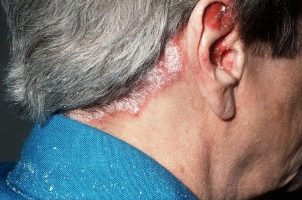
PSORIASIS PREVENTION
The disease can occur at any age, but is more common in the age group from 49 to 69 years. The prevalence of psoriasis reported in the country ranges from 0, 09% and 11, 4%, making psoriasis a serious global problem.
Although there is a widespread misconception that psoriasis is not as serious as other non-dermatological pathologies, psoriasis poses a burden of disease that goes beyond dermatological symptoms. The psychological effects are similar to cancer, heart disease, diabetes. Psoriasis plaques are often visible, which can have a negative impact on interpersonal relationships, school or work success. Not surprisingly, people with psoriasis have higher rates of depression with an increase in the number of suicidal thoughts.
Patients with psoriasis are also at risk of developing serious comorbidities that will complicate disease control and increase the risk of early death. Cardiovascular disease and metabolic syndrome are more common in patients with psoriasis.
In addition, psoriasis itself is a risk factor for cardiovascular disease, three times the relative risk of myocardial infarction. Severe psoriasis is also associated with an increased risk of death, resulting in a decrease in life expectancy of 3, 5 and 4, 4 years for both men and women, respectively, compared with people without psoriasis.
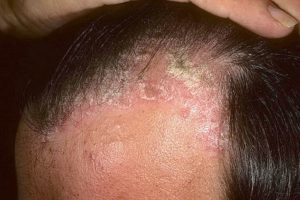
CAUSES OF PSORIASIS IN THE HEAD
There are many theories about the origin of psoriasis. These are the influences of microbes, viruses, allergies, poor hygiene, disruption of blood supply to the skin, disruption of the balance of function of internal organs, and one of the most pressing at this time is the nature of autoimmune diseases, when human immune cells invade their own tissues. Even this assumption remains a theory, because so far no antibodies have damaged the skin in psoriasis patients.
At this time, the cause of the pathology is still unknown. But in research, scientists have identified factors that, with a certain degree of probability, can provoke psoriasis.
The following are distinguished:
- Descendants. There is no one hundred percent chance that even if the mother and father are sick, their child will definitely suffer from psoriasis. But in such cases, the risk of getting such a pathology is higher. It is also noted that if one of the twins is ill, the second twin is more likely to fall ill compared to the common risk in the population. This proves that this nosology has genetic prerequisites.
- Skin damage: accidental knife wounds, cat scratches, mosquito bites, sunburn increases the risk of triggering another outbreak.
- Infections: Staphylococcal, streptococcal and other infections can also act as triggers. Children often experience streptococcal tonsillitis before the onset of skin psoriasis manifestations.
- There are medications that can trigger the disease, such as anti-malarial drugs, some anti-depressant drugs.
- Changing your HIV status to positive can also encourage the development of psoriasis. Therefore, testing for HIV when psoriasis is suspected is not uncommon.
- Pressure. The most famous trigger for the general public. "This is all because of stress" - every psoriasis patient has heard this expression at least once. Some people doubt this expression, but have their own justification. Scientists believe that our immune system can respond to emotional and mental stress as well as physical defects such as trauma and infection.
- Being overweight negatively affects the whole body systematically, and if an obese person has a history of psoriasis, treatment is more difficult and often less effective.
- Smoking. It has long been observed and it is no secret to anyone that smoking has a negative effect on skin condition. It is therefore possible to provoke psoriasis, especially damaged head and hands.
- Alcohol is one of the common causes of psoriasis.
- Hormonal changes. The disease often manifests itself during puberty. Menopause can also provoke psoriasis, but during pregnancy, a decrease or even complete regression of plaque is observed.
SYMPTOMS OF PSORIASIS ON THE HEAD
In 50% of cases, psoriasis makes itself felt from the head. Psoriasis can appear anywhere on the head. Sometimes small plaques develop that are easily hidden in the hair, but when the entire scalp is covered, it is difficult to hide the plaque.
The appearance of psoriasis on the head will be as follows:
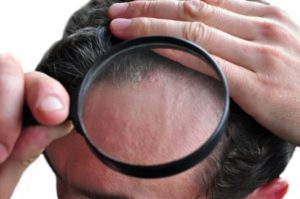
- Red spots on the scalp. Some spots may be fine due to fading, but there are also bright red elements that are easy to see.
- Scales peel off psoriatic skin. The condition of the scalp in this pathology may resemble normal dandruff. But there is a difference, so, for example, with psoriasis, a silvery glow is observed, and can even be accompanied by itchy skin.
- Dry scalp. The scalp can dry up so that the skin will crack and bleed, which will create conditions for the addition of infection, whose treatment in such localization has certain difficulties.
- Itching. This is one of the most common symptoms. Some people experience a slight itching, which may be forgotten by the patient in daily activities, and some experience severe itching that can not be done, study and even sleep.
- Bleeding. Because scalp psoriasis can be itchy, patients can scratch the skin, damaging it. In addition to bleeding, scratching can worsen the course of psoriasis by making the plaque bigger and denser. This is why dermatologists tell their patients, "Try not to injure the scalp. "
- Burn. The patient may describe his head as "burning".
- Hair loss. Rubbing the scalp, using force to remove scales can cause hair loss. Although this phenomenon is temporary, it can still cause difficulties to patients.
These clinical manifestations can quickly, well increase and collapse. This is an individual process. In one patient, the entire pathological process will end in one pale plaque under the hair, while the other will have a lot of bright focus all over the head. This is influenced by, among other things, the triggers mentioned above.
A number of problems that patients may face:
- Skin manifestations can be seen by others. Living with psoriasis can embarrass a person. All aspects of social life can put pressure on these people, such as dating.
- Finance. Treating psoriasis can be expensive. This is more accurately the case with widespread psoriasis than conventional therapy, which is used for new drugs based on monoclin antibodies.
- Pain. Chronic pain can occur with psoriasis, which further increases the level of stress. This will occur especially when skin manifestations are combined with inflammation in the joints, thus reducing a person's daily activities.
- Healing. Especially when the patient asks for help late, some procedures do not give the expected effect, which of course worries the patient, emotionally suppresses it. Other procedures can be time consuming. For example, you may need to receive phototherapy 3 times a week for up to a year. For some, such a regime would be difficult to adapt to the rhythm of standard living.
- Living with Chronic Illness. Psoriasis, like many other chronic pathologies, requires voluntary effort. It is difficult for the patient, especially in the early stages, to overcome a number of additional problems that "fall on his head". This creates the conditions for depression to occur.
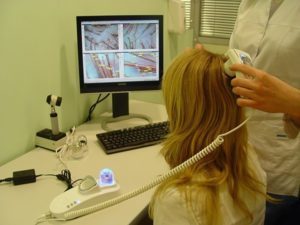
DIAGNOSTIC PSORIASIS ON THE HEAD
The decision of whether to see a doctor or not depends on the patient depending on the severity of the symptoms. However, the best solution, regardless of plaque localization, is to see a doctor. In order for further treatment to be successful, it is necessary to make an accurate diagnosis, even if the symptoms are mild.
In most cases, scalp psoriasis is diagnosed after a physical examination and analysis of medical history.
A dermatologist can diagnose scalp psoriasis by examining pathological elements on the skin.In rare cases, patients may be advised to undergo a skin biopsy to rule out other diseases.
HEAD PSORIASIS TREATMENT
Unfortunately, there is currently no cure for this disease. Therapy is needed throughout life and aims to maintain forgiveness. In addition, treating patients with psoriasis not only requires skin treatment, but is also very important to control existing chronic diseases and prevent new ones.
These conditions include cardiovascular disease, metabolic disease, and psychological health.
Treatment goals:
- To achieve clinical recovery of the patient as soon as possible;
- Remission must be stable and long-term;
- Maintain the patient's positive psychological status.
DIET FOOD
Treatment traditionally begins with diet. Foods that contain antioxidants such as vitamins C, E, beta-carotene (vegetables, fruits, sage, ginger, etc. ) can play a positive role, as well as omega-3 fatty acids, which are rich in salmon, sardines and fishanother.
The link between alcohol and psoriasis is unclear, but experts say that people who drink less respond to treatment, and psoriasis reduction occurs after stopping alcohol abuse. In addition, some antipsoriatic drugs are not compatible with alcohol.
A clearer relationship is observed with being overweight. In obese people, as a rule, pathology develops faster with a brighter clinical picture.
SHAMPOO
Hair makes the treatment of scalp psoriasis difficult. Few people agree to remove their hair to resolve the clinical manifestations of the disease more effectively, especially considering the fact that the defect will be more pronounced in others.
Conventional hair care products are not suitable in this condition, as they can also irritate the scalp, contributing to the development of pathology. Therefore, tar shampoo is used, its effectiveness in combating scalp psoriasis has long been observed.
Tar has a "calming" effect on the epidermis of the scalp, preventing the formation of scales. In addition, shampoo with phenolic acid is used, as it has a keratolytic effect (destroys dense horn scales). Plus is used to increase the penetration of other drugs, including corticosteroids.
When prescribing shampoo, a person's individual characteristics in hair hygiene are taken into account. For example, some women do not wash their hair every day, so it is better for them to apply the solution on their hair before bed 2-3 times a week, followed by washing their hair in the morning.
PHENOLIC ACEN
Phenolic acid can also be used alone as an ointment. The fact that the ointment is used for a long time increases the effectiveness of its hyperkeratic properties. And for patients who complain about the difficulty of separating the scales from their hair, using an ointment before bathing can help overcome this condition.
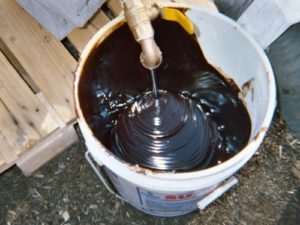
PITCH COAL
Coal tar has been used as a treatment for psoriasis for decades because of its strong antiproliferative, anti-inflammatory, and antipruritic effects.
Although raw coal tar is the most effective resin. Apply raw rock tar to problematic scalp. It is generally recommended to use a resin solution (5-20%) formulated as a lotion or added to corticosteroids. This drug helps to fight psoriasis, but has a number of side effects: coloring, thinning of the hair and more serious negative effects - carcinogenic, because the use of this method is limited.
For example, for this reason, coal tar is banned in Canada and the European Union.
CORTICOSTEROIDS
Of all the topical treatments available, corticosteroids have proven to be most effective in clinical trials for scalp psoriasis and are the most common treatment. Corticosteroids are also useful because there are a large number of forms of production for any condition: creams, lotions, ointments, oils, gels, foams, solutions, sprays and shampoos.
Do not underestimate the importance of psychological harmony in this pathology. Stress can be a trigger, causing a detailed clinical picture, and hindering the treatment process. Therefore, patients with internal anxiety are advised to consult a psychotherapist, psychologist.
PROPOSED CARE FOR HEAD PSORIASIS
It is important for patients with psoriasis to first follow the doctor's advice, but by following the simple rules that will be explained below, you can further improve the quality of life:
- Use a moisturizing lotion. Skin manifestations of the disease worsen when the skin is dry, so it is important to maintain skin moisture. Special cosmetic ointments, lotions, or, for example, regular petroleum jelly can help with this.
- Take good care of your skin with psoriatic plaques. When washing hair, never forcibly peel tight scales onto the skin, as you can only spread the process to nearby healthy tissues.
- Be careful when cutting nails. The case is explained when accidental damage to the nail growth zone with manicure scissors gives rise to the appearance of new skin elements.
- Find the right shampoo for you that does not exfoliate your skin for use on your scalp in a state of remission. Or continue to use tar completely, only at lower concentrations, for daily care.
- Climate can also play a role. It has been observed that the common cold has a negative effect on the patient, provoking the development of plaque. Sunny weather causes a decline in skin manifestations, but not always.
- Use a moisturizer. This can maintain skin moisture and eliminate bad dry air for psoriasis patients.
- Do not take drugs that can harm your skin. Your doctor should tell you about all the medications you are taking, even if the medications you think are harmless. For example, for the treatment of depressive conditions, preparations containing lithium salts may be used, which are contraindicated for patients with psoriasis.
- Avoid all types of skin damage: scratches, cuts, bruises. Injuries to the skin can lead to a condition called the Koebner phenomenon (when psoriatic elements develop along the line of damage to the skin). Be careful when shaving. Try to avoid acupuncture, avoid tattoos on your body, and do whatever you can to prevent insect bites.
- Trying to appear in the sun, but in moderation. Ultraviolet rays in the sun slow down the growth of skin cells, so getting a moderate dose of UV is beneficial (30 minutes at a time is enough). Excessive sunlight display, paradoxically, but can provoke psoriasis. Also, remember that certain medications can make your skin more sensitive to UV rays.
- Patients with psoriasis should reduce their level of anxiety. Of course, this is easier said than done, but relaxation techniques such as meditation or yoga can be tried.
- Estimate how much alcohol you drink. The link between alcohol and psoriasis is unclear, but scientists still believe it can worsen symptoms, especially in men. It is well known that alcohol is harmful when combined with certain psoriasis medications.
- Balance your diet and try to lose weight. If it is difficult for you to do this yourself, get help from an expert who can assess which direction it is worth working better.

RECOMMENDATIONS FOR HANDLING OF PSORIASIS RESULTS IN THE HEAD
By monitoring the development of psoriasis, you can help patients better control their disease and take the necessary steps in a timely manner, as well as increase the productivity of doctor-patient relationships. Some simple rules will help you in this:
- Make a "self portrait" of psoriasis outbreaks. A digital camera, smartphone or a piece of paper will help you, where you can record all the changes that occur on the plaque. It is also worth noting where the changes initially appear and in what order they are raised. For such an examination, the doctor will only praise you and will know that you are determined. Over time, by analyzing recordings, one can identify patterned situations, for example, outbreaks always start with plaques on the occiput.
- Every time psoriasis develops or progresses, try to find out what it is. Maybe the weather has changed? Out of medicine? Are you taking new medications? Newly damaged skin? Such triggers can be individual, making it difficult for doctors to understand without introspecting the patient (for example,
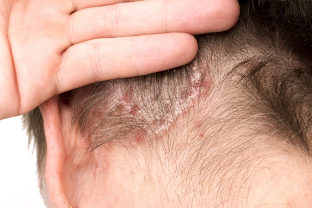 attacks cause certain types of coffee).
attacks cause certain types of coffee).
Although the disease is not contagious through contact, the appearance of the patient frightens those who do not know. Beauty salons are afraid to provide services, some taxi drivers do not want to transport such people, it is difficult to get a job. Not yet starting a family, and the fear that their children will be destined to experience the same suffering prevents them from having children.
There have even been cases described when people with psoriasis were denied training at the Olympic swimming pool in response to collective complaints from other athletes. Management should reject such people, despite the fact that they understand that this pathology is harmless in a contagious sense.
It is difficult for them to do daily activities, because the burden of psychological stress is high, and one needs social relationships. For these reasons, communities for the protection and support of psoriasis patients were formed in many countries. Companies are deployed to educate outsiders about the disease.
People should be judged by their actions, their actions, and not by their appearance. Indeed, among patients with such nosology there are doctors, police officers, firefighters, athletes, and many more who are very professional, because their actions are not only their relatives, but also their country can be proud of them.























